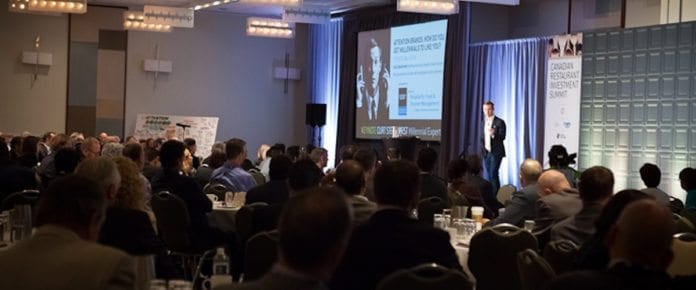TORONTO — Change is pervasive, but it’s how foodservice operators respond to the challenges it presents that makes the difference. That was the theme of yesterday’s Canadian Restaurant Investment Summit (CRIS) hosted by GE Capital and held at the Hilton Toronto hotel.
Nearly 30 speakers and a couple hundred foodservice operators, executives and suppliers gathered at the conference, which began with chef Donna Dooher, owner of Toronto’s Mildred’s Temple Kitchen, introducing herself as the new president and CEO of Toronto’s Restaurants Canada.
After introductions, the day began with a look at the challenged economy. “The biggest problem impacting the Canadian economy is oil,” said Chris Elliott, senior economist, Restaurants Canada in Toronto, noting that the Consumer Confidence Index is dropping, retail spending is down and household debt is on the rise. Conversely, Jacob Mancini, senior manager, Franchise – Restaurants, GE Capital in Toronto explained that investors are still interested in the restaurant space, which has strong same-store sales growth and improved product offerings.
That said, the foodservice landscape is challenged as consumers gravitate towards the fast-casual model, home-meal replacements and better quality food, while visiting restaurants less. “We’ve seen a pull-back in consumers visiting restaurants daily,” noted Robert Carter, executive director, NPD Group in Toronto, noting that any limited traffic growth is coming from the quick-service segment, as breakfast and lunch dayparts grow, supper and snack dayparts slow and more customers turn to retail for home-meal replacements. The growth of the average eater check is driving sales. Carter noted top operators are standing out by offering menu innovation, premiumization of core menu items, creating a price/value balance and introducing limited-time offers and new technological tools.
Meanwhile, attendees learned the advantages of the online review sphere in a break-out session about best practices for online consumer communication on the review site Yelp. “Replying to a one-star review is your way of changing the story,” said Evelyn Wiseman Akerman, senior community manager and director of Marketing for Yelp in Toronto, noting 80 per cent of reviews on the site are three stars or higher. Other panellists agreed. “Turn [online reviewers] into humans by speaking to them as humans,” said Andreas Antoniou, managing partner, Estiatorio Volos and Little Anthony’s in Toronto, adding that reviews (good or bad) can create better business practices. The consensus was clear: restaurant operators should add photos, video and accurate information to their online review pages that already exist and respond consistently to reviewers with the resources afforded them.
It’s all about creating new thought processes. That idea was highlighted at a plenary session and workshop run by Curt Steinhorst (pictured), millennial expert and president of The Promentum Group, a Texas-based communications consultancy. “You have to understand Gen Y … or you will have massive problems moving forward,” he said, explaining that the cohort is the fastest-growing demographic. The disconnect? The average millennial started their first job five to six years later than the average baby boomer, so they don’t understand the working world; and they grew up in a technologically advanced world, so they don’t like face-to-face communication. What they do like is unique experiences and visual stimulation (photos, video). Learn how to get the best out of this cohort. “Gen Y needs to feel challenged, valued and included,” explained Steinhorst. So, shift expectations, mentor them, introduce technology and give them the feedback they crave. After all, change is key to succeeding in an evolving landscape. NPD’s Carter said it best earlier in the day: “Change is inevitable, growth is optional.”


















